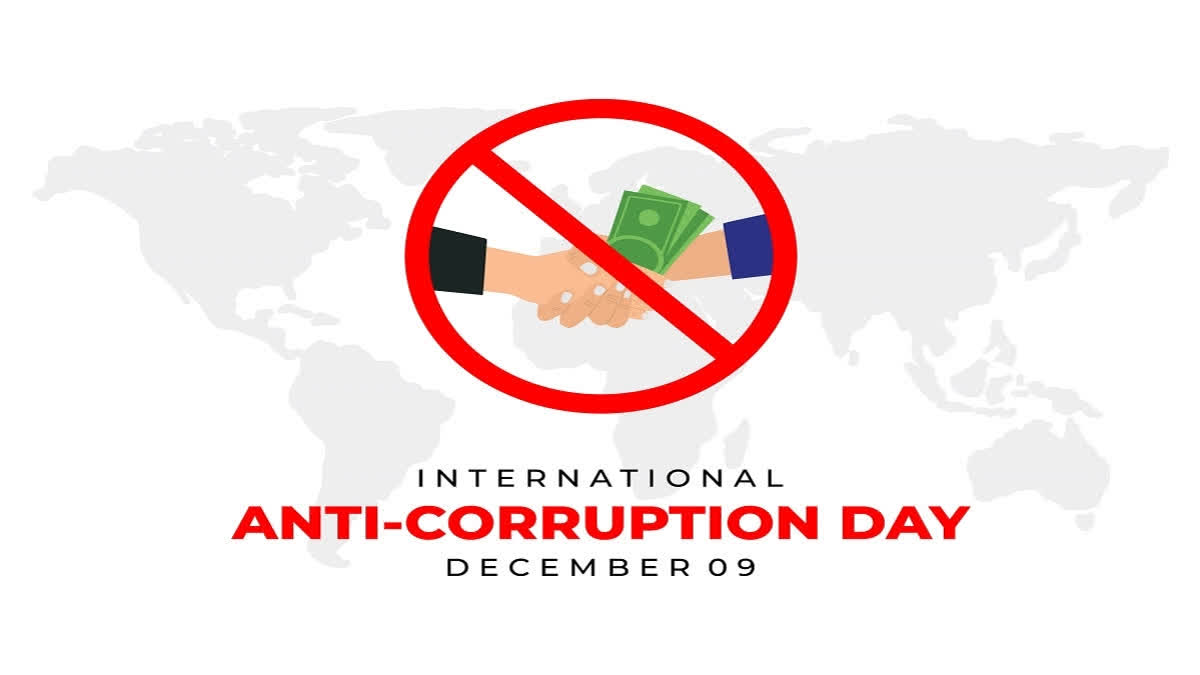Hyderabad: International Anti-Corruption Day is being observed on December 9 every year to emphasise the need to tackle corruption which is in a variety of forms across the globe and has its far-reaching consequences.
The United Nations Convention against Corruption (UNCAS) was adopted by the UN General Assembly in 2003 and since then, adherence to the world’s first legally-binding, anti-corruption instrument has become near-universal, with 190 countries became parties to the Convention. Later on, the World Bank Group also considered a major challenge to its twin goals of ending extreme poverty by 2030 and boosting shared prosperity for the poorest 40% of people in developing countries. Hence, this day seeks to mobilise individuals, governments, and organisations to take a stand against corruption.
- Disproportionate Impact on the Poor
Corruption undermines trust in institutions, hampers economic development, and erodes social justice. Corruption has a disproportionate impact on the poor and most vulnerable, increasing costs and reducing access to services, including health, education, employment, and justice. For example, corruption in the procurement of medicines and medical equipment for public hospitals not only drives up costs, but also will lead to the supply of sub-standard products causing life-long adverse impacts on health of people. Empirical studies have revealed that the poor pay the highest percentage of their income in bribes. Some studies have shown that the poor may even be intimidated since they are seen as powerless to complain. Every stolen or misdirected dollar, euro or rupee robs the poor of an equal opportunity in life and prevents governments from investing in their human capital. In a post-COVID-19 pandemic world, it is even more important to understand why countries should invest in human capital and protect hard-won gains from being eroded.
Corruption impedes investment, with consequent effects on economic growth and jobs. Countries capable of confronting corruption utilise their human and financial resources more efficiently, attract more investment, and grew more rapidly. Corruption might deceitfully determine the winners of government contracts, with awards favouring friends, relatives, or business associates of political leaders and government officials, often known as crony capitalism. Perhaps the costliest and the worst form of corruption is in the form of capturing political power through manipulating or distorting the institutions and officers who control them. Addressing all such types of corruption is critical in achieving progress and sustainable change.
- Four Provisions of Tackling Transnational Corruption
In 2023, as UNCAC reaches its twentieth year of existence, this is time to reflect on what the Convention has meant for global efforts to tackle corruption and, crucially, what remains to be done to fully implement this important tool. Such a global efforts may be considered four provisions or mainstays of the Convention: Prevention of corruption, Criminalisation, international cooperation, and asset recovery.
Prevention: An entire chapter of the Convention is dedicated to prevention, with measures directed at both the public and private sectors. These include model preventive policies, such as the establishment of anti-corruption bodies and enhanced transparency in the financing of election campaigns and political parties. Once recruited based on merit, public servants should be subject to professional and ethical codes of conduct, requirements for financial and other disclosures, and appropriate disciplinary measures. Transparency and accountability in matters of public finance must also be promoted, especially in critical areas such as public procurement and the judiciary. Citizens must expect a high standard of conduct from their public servants. Prevention of corruption also requires an effort from all members of society at large. The involvement of non-governmental and community-based organisations, as well as other elements of civil society need to be strengthened to establish and promote effective practices aimed at the prevention of corruption.
Criminalisation: The Convention requires countries to establish criminal and other offences to cover a wide range of acts of corruption, if these are not already crimes under domestic law. Offences committed such as trading in influence, the concealment and laundering of the proceeds of corruption, and obstructing justice are also dealt with.
International Cooperation: Countries agreed to cooperate with one another in every aspect of the fight against corruption, including prevention, investigation, and the prosecution of offenders. They are also required to undertake measures which will support the tracing, freezing, seizure and confiscation of the proceeds of corruption.
Asset Recovery: Countries agreed on asset-recovery, which is stated explicitly as a fundamental principle of the Convention. This is a breakthrough especially for many developing countries where high-level corruption has plundered the national wealth, and where resources are badly needed for reconstruction and rehabilitation of societies under new governments. Several provisions specify how cooperation and assistance will be rendered. Effective asset-recovery provisions will support the efforts of countries to redress the worst effects of corruption while sending at the same time, a message to corrupt officials that there will be no place to hide their illicit assets.
Where does India Stand?
